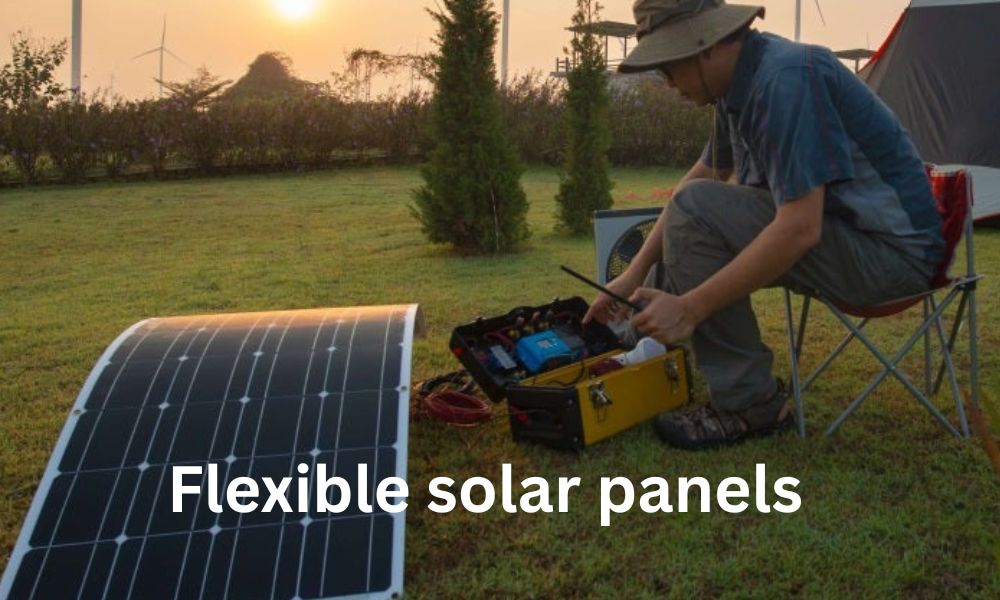Flexible solar panels for van roof are the excellent source of free energy for the travellers in the world. Flexible solar panels for van roofs are a big step forward for living in a van and going on trips without power. These panels are fantastic for campervans and RVs since they are lightweight, thin, and simple to install. They also properly conform to curved surfaces.
This is also very informative that Flexible solar panels don’t need heavy hardware or large brackets for attaching like rigid panels do. They provide quiet, clean, and renewable energy that is ideal for charging mobile devices, fans, refrigerators, and lighting. These Flexible solar panels offer an effective and compact way to keep energized wherever your travels take you, whether you’re camping, touring, or living in your van full-time.
Why Choose Flexible Solar Panels for Your Van Roof?
Why Choose Flexible Solar Panels for Your Van Roof and here we will discuss it completely one-by-one with some detail as under.
1. Space-Saving Design
Most van roofs aren’t flat—and flexible panels can hug the surface neatly without sticking up or needing large mounts. This low-profile design also reduces wind drag while driving.
2. Lightweight
Unlike traditional panels, flexible solar panels weigh only a few pounds. This puts less strain on your van’s roof and suspension system, especially important for smaller or older vans.
3. Simple Installation
No need for drilling holes or complex mounting brackets. Many flexible solar panels come with peel-and-stick adhesive backing, or you can secure them with silicone or double-sided tape.
4. Durability
Made for outdoor use, these panels are often waterproof, UV-resistant, and can handle rain, dust, and sun exposure.
5. Ideal for Off-Grid Living
Whether you’re boondocking in the wilderness or parked at a beach, flexible panels can power your van appliances with clean, silent solar energy.
Best Uses for Flexible Solar Panels in a Van
You can use flexible solar panels to power:
- LED lights
- Ventilation fans
- USB charging ports
- Small refrigerators or coolers
- Water pumps
- Laptops and camera gear
With the right setup, you can be completely off-grid and self-sufficient—even in remote areas with no access to hookups or electricity.
How Many Watts Do You Need?
This depends on your energy usage. A typical van setup might include:
| Appliance | Power (Watts) | Usage Hours | Daily Use (Wh) |
|---|---|---|---|
| LED Lights | 20W | 5 hrs | 100 Wh |
| Fridge/Cooler | 45W | 24 hrs | 1080 Wh |
| Laptop | 60W | 2 hrs | 120 Wh |
| Fan | 30W | 4 hrs | 120 Wh |
| Phone Charging | 10W | 3 hrs | 30 Wh |
Total daily use: ~1450Wh
To cover this, you’d need at least 300 to 400 watts of solar panels, depending on your location and sun exposure.
Pros and Cons of Flexible Solar Panels for Van Roofs
There are a lot of Pros and Cons of Flexible Solar Panels for Van Roofs and here we will discuss them as under.
✅ Pros:
- Easy to install (even DIY)
- Lightweight and slim
- Bendable for curved surfaces
- No noise, fuel, or fumes
- Low maintenance
❌ Cons:
- Slightly less efficient than rigid panels
- Can get hotter (less ventilation between panel and roof)
- Shorter lifespan (typically 5–10 years)
- Prone to wear if not installed properly
Installation Guide: How to Install Flexible Solar Panels on a Van Roof
What You’ll Need:
- Flexible solar panels (100W to 400W total recommended)
- Charge controller (MPPT preferred)
- Deep-cycle battery or lithium battery
- Inverter (for AC appliances)
- Mounting tape or adhesive (3M VHB or silicone)
- Wiring kit (fuse, MC4 connectors, cables)
Step-by-Step:
- Clean the van roof thoroughly to remove dust and oil.
- Place the panels where they get the most sunlight. Avoid shaded spots.
- Stick or screw the panels down securely.
- Run wiring into the van via a cable entry gland or waterproof housing.
- Connect to a charge controller, then to your battery system.
- Test everything before sealing up!
Tip: Always fuse your system for safety.
Maintenance Tips
Flexible solar panels are mostly maintenance-free, but here’s how to keep them in top shape:
- Clean regularly with a soft cloth and water (no harsh chemicals).
- Check wiring every few months for wear or corrosion.
- Avoid walking on panels, even if they claim to be walkable.
- Reapply adhesive if you notice any lifting corners.
Cost of Flexible Solar Panels for Vans
Prices vary depending on brand, wattage, and quality:
| Wattage | Price Range (USD) |
|---|---|
| 100W | $80 – $150 |
| 200W | $150 – $250 |
| 300W | $250 – $400 |
Complete kits with charge controllers and wiring may cost between $300 to $600 depending on your needs.
Best Brands to Consider
Some trusted brands for flexible solar panels include:
- Renogy – Reliable performance, great customer service
- SunPower – High efficiency, premium price
- Topsolar – Budget-friendly kits
- Newpowa – Affordable and durable
- BougeRV – Popular for RV and van setups
Always check customer reviews, warranty info, and specs before buying.
Are Flexible Panels Better Than Rigid Panels for Vans?
It depends on your van setup.
If you want something lightweight, low-profile, and easy to install, flexible solar panels are ideal. But if you need maximum efficiency, long life, and rugged performance, rigid panels may be a better investment—especially if you’re mounting them on a roof rack or flat surface.

